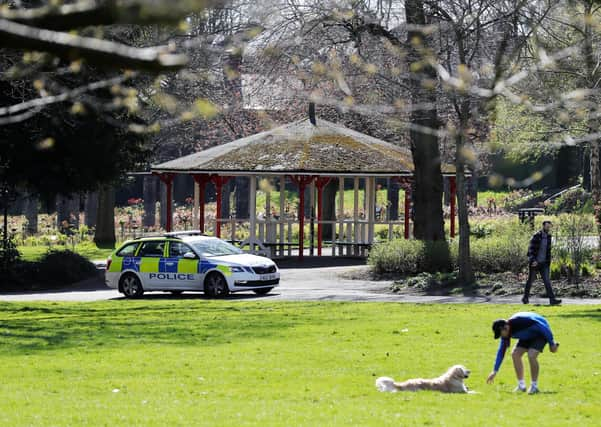Coronavirus: Spotlight on police powers amid renewed pleas not to travel for exercise reasons


Today police on the north coast warned householders not to visit their region on day trips during the traditional holiday period.
Superintendent Jeremy Lindsay said in a statement “essential” travel is allowed, but that “the legislation does not, however, provide that you may travel for the purpose of exercise”.
Advertisement
Hide AdAdvertisement
Hide AdThis echoes remarks made by health minister Robin Swann said on Tuesday night: “Especially as we come into the Easter holidays, you’ll see an increased presence of the PSNI on our roadsides making sure anybody who’s taking a journey outside the home is doing so because of essential purposes.”
Police said last night they had approached people in a tent on a beach in Portrush, gave them “the appropiate advice, guidance and warning”, and they went home.
Also last night, Policing Board DUP member Mervyn Storey said that Assistant Chief Constable Alan Todd has been “very clear” with him, that if people leave home “without reasonable excuse” they will be vulnerable to police action.
However, the exact wording of the Northern Ireland regulations (which entered force on March 28) do not explicitly state that police have the power to order park visitors to go home.
Advertisement
Hide AdAdvertisement
Hide AdSection 5 gives about a dozen “reasonable excuses” for the public to leave home, such as for food, medicine, or funerals.
If someone is caught away from home without “reasonable excuse” police can order them home or take them there using “reasonable force”.
If they fail to comply then they are committing an offence and the police have the power to arrest them “to maintain public health” or “public order”.
The police can also issue on-the-spot fines of £60.
But questions remain over what the “reasonable excuses” are under the law.
Advertisement
Hide AdAdvertisement
Hide AdThe regulations merely say that the dozen-point list “includes” some of the valid reasons – suggesting there are other vaild reasons which just are not written down.
Section 5 also actively allows travel for work or volunteering – but does not actively forbid other kinds of travel, such as travel to beauty spots for exercise.
The News Letter put it to the PSNI that the Northern Irish regulations do not explicitly give them the power to force people home for visiting a park or beach.
The PSNI did not answer directly. Instead it issued a copy of an address given by the Chief Constable Simon Byrne urging people not to visit parks and beaches.
Advertisement
Hide AdAdvertisement
Hide Ad“Now isn’t the right time – you need to follow the rules that have been put in place,” he said.
“You should only be leaving home for a number of key reasons – these include getting food and basic supplies, seeking medical assistance and taking exercise close to your home. Please – do not get into your car and travel excessively for exercise. “
He went on to say: “We will only use enforcement when it is absolutely necessary – if people are not listening and putting lives at risk.”
The Executive Office said the regulations are “clear” and such actions would be “reckless” and are “likely to create gatherings of people”.
Advertisement
Hide AdAdvertisement
Hide AdThe wording of the Northern Irish regulations are clear, however, that the police do have the power to break up gatherings.
Basically, people will be committing an offence if they gather in groups of three or more – unless they are all from the same household.
If they do, police “may take such action as is necessary”.
They may order them to disperse or go home, or take them home directly.
Police have the power to arrest such people if they do not follow instructions.
They can also hand out on-the-spot fines of £60.